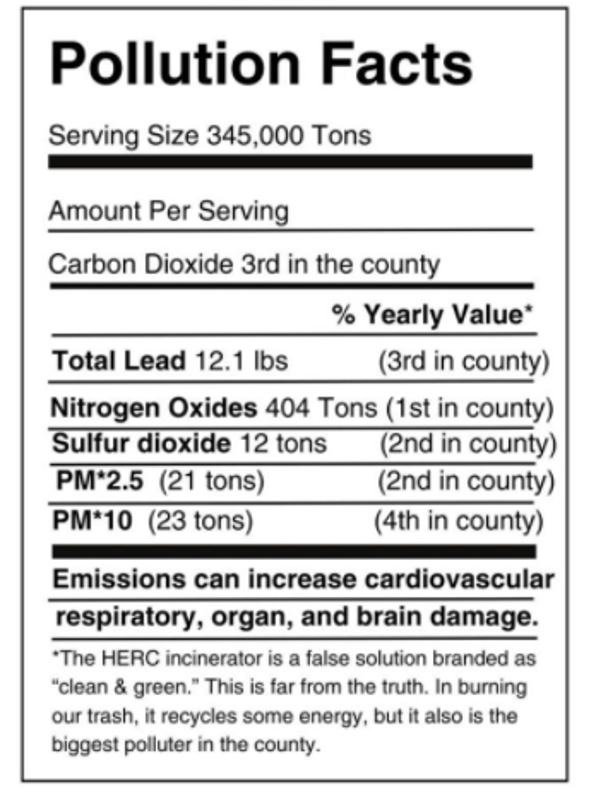Thanks To Grassroots Organizing and Strategic Research, One of Minnesota’s Dirtiest Polluters Is On Its Way to Closing Down
After years of coalition building and persistent advocacy by racial and climate justice organizers, legislators have passed a new bill that would close down the Hennepin Energy Recovery Center (HERC)—a giant waste incinerator that has been a leading polluter in Minneapolis since it opened in 1989. This huge win proves that strong coalitions armed with research can bring about real policy change for communities impacted by harmful pollution.
By Charles Frempong-London (Minnesota Environmental Justice Table), Jillian Du, and Maria Hart
Beverly Propes has seen first-hand the harm that the Hennepin Energy Recovery Center (HERC)—Minneapolis’s giant waste incinerator—has inflicted on people living nearby.
As a school nurse who worked for 30 years in the North Minneapolis neighborhoods surrounding the HERC – many of which have high concentrations of low-income, Black residents – Propes frequently treated kids with asthma. She even had to keep extra inhalers and nebulizers around for those with severe cases who would otherwise end up in the ER.
For the nearly quarter of a million people living within a three-mile radius of the HERC, dirty air, chemical fumes, pungent odors, and the risk of poor health have become a part of daily life.
Since built in 1989, the HERC has been burning roughly 1,000 tons of trash a day. For the nearly quarter of a million people living within a three-mile radius of the HERC, dirty air, chemical fumes, pungent odors, and the risk of poor health have become a part of daily life. Nearby neighborhoods struggle with the highest rates of hospitalization for asthma in the state.
But this is changing soon: thanks to the passage of Minnesota’s 100% clean energy bill in February of this year, the legislation declares that the HERC needs to close by 2040, and will no longer be considered a source of “renewable” energy in the state’s clean energy standard.
This is a huge win for the environmental justice movement in Minnesota, as waste incineration is one of the most unhealthy and unjust forms of energy generation out there. A well-organized grassroots campaign and research partnerships, led by racial and climate justice organizers like Propes, MN Environmental Justice Table, Comunidades Organizando El Poder Y La Acción Latina (COPAL), Minnesota Interfaith Power & Light, and TakeAction Minnesota, were instrumental in getting this new legislation with the HERC shut down passed.
Backing Up Decades-Old Truths With Data
Community members have long been protesting the highly polluting HERC waste incineration plant in North Minneapolis. Residents first came out in opposition to the HERC after a 1988 lawsuit resulted in the plant being sited in downtown Minneapolis rather than the less-dense (and more affluent) suburbs. It wasn’t until 2014, however, that organizers had their first major success in blocking a permit to expand the plant’s processing capacity. Organizers were able to generate momentum from this win to broaden their campaign and focus on power building, eventually uniting their efforts under the Minnesota Environmental Justice (EJ) Table.
In 2022, in support of the MN EJ Table’s work, the Equity Fund commissioned PSE Healthy Energy to conduct technical analysis on the impacts of air pollution generated by the HERC as well as the cumulative burden of environmental, social, and health vulnerabilities associated with the zip codes adjacent to the facility.
Credit: Minnesota Environmental Justice Table, based on PSE Healthy Energy’s analysis.
The findings were stark: the HERC burns nearly 350,000 tons of trash every year and is responsible for 25% of the total amount of nitrogen oxide pollution generated from stationary sources in Hennepin County. It is also a leading emitter of sulfur dioxide and particulate matter, all of which can increase the risk of cardiovascular disease, respiratory illnesses, cancer, and organ and brain damage, particularly in children and elderly residents.
In addition to pollution generated by the incineration process, the 200 heavy-duty trucks delivering waste to the HERC every day release diesel particulate matter and other health-damaging air pollutants into nearby neighborhoods. PSE Healthy Energy estimated that emissions associated with the HERC result in $11 to 24 million per year in health impacts.
Combined with base-building efforts and community testimonies, these findings helped to bolster the campaign to shut down the HERC and convince state legislators to include stronger equity provisions in the state’s 100% clean energy bill.
Looking Ahead
The fight for environmental justice is far from over in Minnesota. For one, there is still no date yet for the official closure of the HERC and advocates are continuing to push against other HERC-enabling plans. Also, despite the removal of HERC from the state’s clean energy standard, the state’s other incinerators – many of which are near low-income and Native areas – can still count as “renewable” energy, a misleading loophole with dirty consequences.
Coordinated advocacy efforts that are informed by data and centered on equity will be key to building power against environmental injustices such as waste incineration in Minnesota and beyond.
As Nazir Khan, co-founder of the MN EJ Table, stated in an interview: “There needs to be organizing but at the end of the day you aren’t going to move people that are ideologically and politically opposed to you by asking them to be nice and to respect your historic or current injustices. You have to come in with power, so let’s build power together first and come to a shared analysis about things.”
For additional information, you can find the commissioned research here. For more information about The Equity Fund’s technical assistance program, contact Jillian Du (jdu@theequityfund.org).
Charles Frempong-Longdon is the Communications Organizer at Minnesota Environmental Justice Table. Jillian Du is the Research and Engagement Strategist at the Equity Fund. Maria Hart is an editorial consultant to the Equity Fund.


